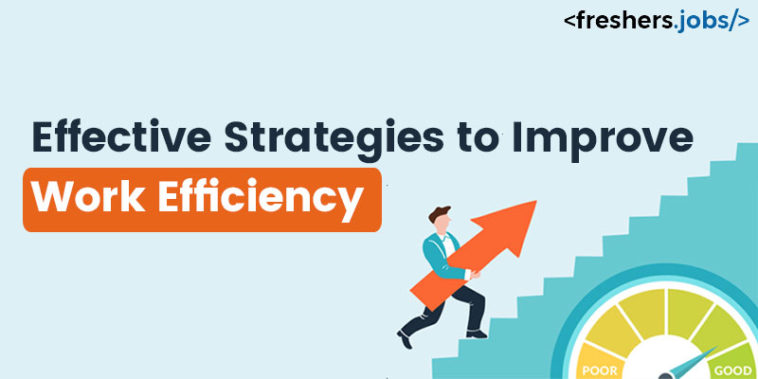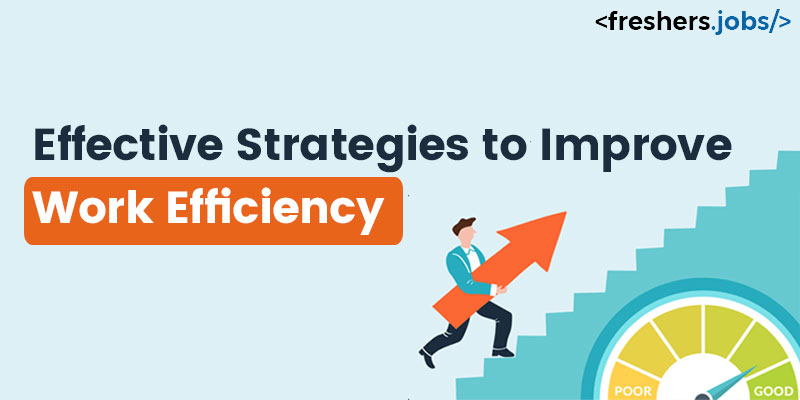Effective techniques to increase work efficiency are essential for people and organisations to achieve their goals and objectives. The ability to generate high-quality work quickly and affordably is called work efficiency. It entails raising overall output while maximising productivity and minimising the wastage of time and resources.
Time management, prioritisation, delegating, automation, and continual learning and development are just a few of the tactics that people and organisations can use to increase the effectiveness of their work. These techniques can improve productivity, lower stress and burnout, and boost job satisfaction.
This blog is important since it can help people and organisations achieve their goals and objectives. The blog will cover some practical methods for increasing work efficiency. A well-run and prosperous firm depends on efficient employees. Workers can perform their duties more effectively and produce high-quality work with the support of structured work habits, which could benefit the company’s bottom line. You can develop and put into practice techniques to increase your productivity at work by having an understanding of efficiency concepts. In this blog, we discuss the value of job efficiency and offer practical tips for boosting productivity at the office.
What is work efficiency?
Work efficiency means getting the most work and jobs done in the least time and effort. High productivity can come from being very good at what you do. Organisations may get workers to work more efficiently and improve efficiency because it can help the business do well.
Why is work efficiency important?
Many workers have tasks with strict deadlines and goals to meet to see how well they are doing their jobs and how much progress they are making. If you take steps to improve how well you do your freshers jobs, it may show your bosses that you are committed to the job, want to do well, and are eager to learn new skills. Maintaining efficiency can help you do your job well and handle your tasks.
Here are the ways things to think about if you want to get more work efficient or how to increase efficiency:
Take breaks
Taking breaks between jobs can allow your mind to rest and start over. If it will take you two hours to finish a job, take a 15-minute break in the middle to eat something or go for a walk. Breaks can help you get more done by letting you return to work with a clear head and more energy.
You can tap into fresher jobs in Bangalore for more job openings and higher job chances.
Set attainable goals
Setting goals can be an excellent way to keep track of the steps you need to take to reach your goal and see how far you have come. So that you can get your goal, it’s essential to make sure it’s doable and realistic. This can keep you motivated, help you handle your time well, and give you a sense of accomplishment when you reach a goal.
Keep track of the time
To determine your productivity or efficiency in workplace, you could measure how long it takes you to do each job task. This can help you decide which jobs take longer and give you a chance to consider why. Then, you can make those jobs more efficient and use your time-management skills to get through your daily task list.
Agree to meet goals
Try writing down your due dates in a planner to manage your time better. It is helpful to use these reminders to make a personal timeline and list of steps that will help you meet a goal. Even though some deadlines may be flexible, setting a plan can help you organise your work, keep you motivated, and help you learn how to be more efficient and how to improve efficiency at work.
Pay attention to the job at hand
Taking care of one job at a time can help you see how far you have come and give you a reason to celebrate success at work. Some jobs may have more than one task or project daily. This might make you want to do more than one thing at a time to get more done on your list. But it’s often better to focus on one task at a time and work steadily towards finishing it. This is because your focus may help you improve the quality of your work and the number of tasks you complete.
Make a schedule
Think of your daily schedule as a list of tasks and make a promise to finish each one. This can help you set goals and standards for the day and develop any time management skills you might need. Include things you have to do at work and time for yourself. All of your daily routines should become habits so your brain and body know what to expect. Getting into these habits can make it easier for you to reach your work goals and work efficiency and help you take care of yourself both at work and outside.
Design a relaxing work schedule
Choose a place of work that makes you want to work. If you work in an office, add pictures of your family that make you feel better. Some people do better in clean, quiet, and well-organised workspaces, while others enjoy and get more done in workspaces with other people. Even if you share a desk with someone else, you can still make it a healthy, relaxing workplace that helps you get more done.
Find a good balance between work and home life
Plan to get your job done during work hours to have time after work for your family, friends, or yourself to improve efficiency. Having set times for leisure and personal goals can help you stay healthy, which in turn makes it easier to do your job. A good balance between work and life can also make you feel good about yourself because it can help you meet your work and personal needs.
Organise a to-do list
Writing and reviewing a list of tasks can help you decide how important each is and develop a plan of action with clear steps and a timeline. Written to-do lists make you more likely to get things done and make you feel good. When you finish a job, you can cross it off to show that you are making progress.
Minimise interruptions
Find or make a quiet place to work where you will be focused. When you can pay more attention to your work, you are more efficient and get more done. Some ways to limit interruptions at work are to set up meetings or appointments with coworkers, set an away message on a chat system, and turn off personal devices so you don’t see alerts. If you work where it’s impossible to avoid distractions, plan a small block of quiet time each day when you can get the most work done, like first thing in the morning.
Ask for feedback
Ask your team members and bosses for feedback and evaluations all the time. Feedback can help you figure out how to increase efficiency and help you come up with new ways to do so. Your bosses also teach you essential new skills and better ways to do your job. Most of the time, it is best to talk to your boss in a private one-on-one meeting. This allows you to speak freely about working habits, voice concerns, and ask questions.
Give people benefits and celebrate their successes
Celebrating what you have done well at work can boost your confidence and motivate you to take on more challenging tasks and efficiency in workplace. You can also get inspired by rewarding yourself when you reach a work goal or finish a high-priority job. Giving yourself rewards can make you more productive at work because they motivate you to meet your goals and do good work.
The Factors Affecting the Work Efficiency
Work efficiency is important in determining how effectively we can carry out tasks. High work efficiency enables us to complete our work promptly and effectively, leading to better productivity and job satisfaction. On the other hand, low work efficiency can result in delays, poor quality work, and even burnout.
Time management
Effective time management is critical to achieving high work efficiency. Poor time management can always make way for missed deadlines, incomplete work, and rushed work. It is essential to prioritise work tasks based on their importance and urgency and to allocate time accordingly. Proper time management can help prevent burnout, reduce stress, boost productivity in work and earn high freshers salary.
Workplace environment
The workplace environment plays a crucial role in work efficiency. An environment that is too noisy, hot, cold, or crowded can negatively impact productivity. A comfortable and conducive environment that is well-lit, well-ventilated, and has appropriate seating arrangements can help boost work efficiency.
Technology
Technology has a significant impact on work efficiency. The right tools and software can help streamline work tasks, automate repetitive tasks, and reduce errors. On the other hand, outdated or inefficient technology can slow down work processes and reduce productivity.
Health and well-being
Physical and mental health play a crucial role in work efficiency. Poor health can lead to fatigue, decreased concentration, and reduced productivity. Employers can promote employee health and well-being by offering wellness programs and healthy food options, and encouraging regular exercise to improve efficiency.
Freshers can work efficiently in big companies like Dell as they encourage work productivity. Start looking for jobs from Dell jobs for freshers.
Communication
Effective communication is essential for work efficiency. Miscommunication, lack of communication, or communication barriers can lead to misunderstandings, delays, and mistakes. Employers can promote effective communication by encouraging open and honest communication, providing feedback, and offering training on effective communication.
Workload and task complexity
Workload and task complexity can have a significant impact on work efficiency. Heavy workloads, unrealistic deadlines, and overly complex tasks can lead to stress, burnout, and decreased productivity. Employers can promote and improve work efficiency by ensuring that workloads are manageable and deadlines are realistic.
Training and development
How to increase efficiency? Proper training and development can help employees develop the essential skills to carry out their tasks more efficiently. Employers can provide training on new technologies, software, and work processes to ensure employees have the skills to do their job effectively.
Motivation and job satisfaction
Motivation and job satisfaction play a crucial role in work efficiency. Employees who are motivated and satisfied with their jobs are more likely to be productive and efficient. Employers can promote motivation and job satisfaction by offering recognition, rewards, and opportunities for career growth.
Conclusion
I hope you are clear from the blog about the Effective Strategies to Improve Work Efficiency. Effective strategies to improve work efficiency are essential for individuals and organisations to achieve their goals and objectives. Organisations can benefit from increased employee productivity, reduced costs, and improved overall performance. It is essential to continuously evaluate and refine these strategies to ensure ongoing success and effectiveness. By prioritising work efficiency, individuals and organisations can improve their overall success and achieve their desired outcomes.




